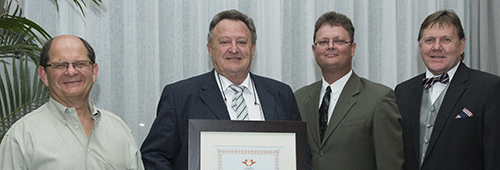
Prof Dap Louw, distinguished professor and forensic psychologist from the University of the Free State, receives a Lifelong Achievers Award from the University of Johannesburg. From left is: Prof Theo Veldsman, head of the Department of Industrial Psychology and People Management at UJ, prof Louw, prof Deon de Bruin, Department of Industrial Psychology and People Management at UJ, and prof Daneel van Lill, dean at Faculty of Management at UJ.
Photo: Jan Potgieter, UJ
It is always good to be honoured by your own university, but it is even more special to be honoured by another university, according to Prof Dap Louw, distinguished professor and forensic psychologist from the University of the Free State (UFS), on an award he received from the University of Johannesburg (UJ).
On 5 November 2015, Prof Louw received the prestigious Lifelong Achievers Award from the Department of Industrial Psychology and People Management at UJ in recognition of the major contribution he has made during his career in psychology. He was one of two recipients of the award during this year’s UJ Top Achievers Awards Ceremony.
Prof Louw had great appreciation for his students and colleagues at the UFS, without who he would have been “without arms”.
Worthy legacy
The Lifelong Achievers Award is presented to retired academics that have, over their careers, consistently made significant contributions to their field, nationally and/or internationally, and have left behind a worthy legacy.
According to the description for the award, the recipient has left behind a legacy in his or her specific field which is gratefully acknowledged by all past, present and upcoming professional colleagues, students, clients and other stakeholders.
This description concludes with: “We are a better science and profession because of you”.
Career full of highlights
Prof Louw is the author or co-author of over 100 articles in accredited national and international journals, and he is an accredited NRF researcher.
He is the principal author and editor of several textbooks currently prescribed by 12 universities in South and Southern Africa. It is estimated that, over the years, more than 100 000 students have received their training via textbooks he has written with his wife, Prof Anet Louw.
Prof Louw holds a master’s and doctoral degree in Criminology, and a master’s and doctoral degree in Psychology. He is the only person in South Africa with these qualifications.
During his career as forensic psychologist, Prof Louw has testified in many familiar criminal cases in South Africa and Namibia.
The Academy of Science of South Africa presented him with the Stals Award for Psychology and he was honoured by The National Honor Society in Psychology in the USA as well.